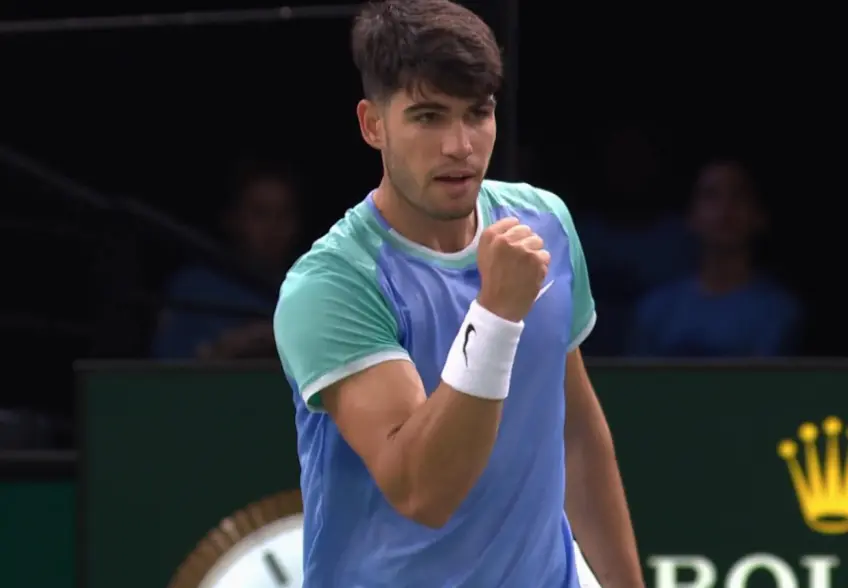
With Jannik Sinner’s withdrawal from the Paris Masters due to an intestinal virus, many now look to Carlos Alcaraz as the tournament’s top favorite. Sinner’s absence leaves a gap that Alcaraz, the former world No. 1, is primed to fill, although the young Spaniard faces unique challenges on these fast indoor courts in Paris-Bercy, where he has struggled in previous years. Alcaraz himself has admitted that he doesn’t favor the conditions of this tournament, finding it difficult to reach his best form toward the season’s end when fatigue often sets in.
Alcaraz, now 21, began his Paris Masters campaign with a somewhat inconsistent win over Chile’s Nicolas Jarry. Despite many unforced errors, he managed to edge out Jarry 7-5 in the first set, taking advantage of his opponent’s slip at a key moment. Although Alcaraz started with a break, Jarry fought back, making the Spaniard work hard to claim the set. In the second set, Alcaraz appeared to find a more comfortable rhythm, but his serve remained vulnerable, giving Jarry several break points. Alcaraz ultimately secured the win, yet he knows he’ll need to elevate his game as the competition heats up if he hopes to claim his first Masters 1000 title in Paris.
Interestingly, this year’s Paris-Bercy courts are reportedly among the fastest in recent memory, further complicating Alcaraz’s path. Rumors suggest the surface speed has been accelerated, with players noting a particularly quick bounce and a slick surface that reduces rally length and requires quick reflexes. Alcaraz, who already felt challenged by the court speeds in Cincinnati earlier this year, voiced similar concerns in Paris. Reflecting on his experience, he remarked, “I feel this is the second-fastest court after Cincinnati, but the ball slides once it bounces. It’s challenging for spectators because long rallies are hard to achieve here. I’m spending hours practicing on these courts, but I’m starting to feel good.”
Alcaraz also commented on his performance in his opening match, sharing that the first set was critical to his confidence. “I played really well at the start, but things got complicated,” he explained. “I’m just happy to have closed out that first set because it allowed me to play with more confidence in the second. Every win here is a gift, especially since it’s been two years since I’ve won a match in Paris-Bercy.” For his next round, Alcaraz will face the winner of Ugo Humbert and Marcos Giron, a challenge that will test his ability to adapt quickly to the court’s unique conditions.
Despite some setbacks throughout the season, 2024 has been a landmark year for Alcaraz. The former world No. 1 celebrated major achievements, including becoming the youngest player ever to win both the French Open and Wimbledon in the same year. He also successfully defended his title at the Indian Wells Masters and won a silver medal at the Paris Olympics. This incredible season solidified Alcaraz’s place as one of tennis’s brightest stars, showcasing his resilience and versatility across different surfaces and conditions.
However, his Olympic silver came with a pang of regret. Alcaraz faced Novak Djokovic in the final, falling short of gold in a match that he later admitted affected his mindset in the subsequent tournaments at Cincinnati and the US Open. Nonetheless, he bounced back to claim the ATP 500 title in Beijing, delivering a standout performance against Sinner in the final. His success continued in the Saudi Arabian exhibition event, the ‘Six Kings Slam,’ where he defeated Holger Rune and tennis legend Rafael Nadal before ultimately losing to Sinner in the final. Despite his positive run, Alcaraz faced criticism for participating in the exhibition, with some fans and pundits questioning the event’s focus on substantial financial rewards for players rather than competitive integrity.
Addressing the controversy, Alcaraz recently acknowledged that financial incentives played a role in his decision to compete in Saudi Arabia. “If I say I went there just for fun or to play, I’d be lying. Everyone works for money as well,” Alcaraz explained. “I love playing tennis, and most of the time, money isn’t on my mind—I play for love or fun. But you have to be realistic; in Arabia, it’s the highest prize money ever, and that was a good motivation for me.” Alcaraz’s transparency sheds light on the realities professional players face, balancing passion and career with the practical benefits high-paying events offer.
Looking ahead, Alcaraz’s season is far from over. After the Paris Masters, he’s set to compete in the Nitto ATP Finals in Turin, followed by the Davis Cup Finals in Malaga, a packed schedule that will continue to test his endurance. Given the taxing nature of this year’s schedule and the cumulative toll of a demanding season, Alcaraz’s journey to Paris-Bercy and beyond will demand both mental and physical resilience. His performances in these tournaments could further establish him as a dominant force in tennis, especially if he adapts his game to the high-speed courts and navigates the challenges posed by seasoned competitors eager to end the season with a strong finish.
For now, Carlos Alcaraz’s journey in Paris-Bercy has just begun, and he stands poised to make an impact, especially with the backing of fans who are eager to see him succeed on one of the sport’s most challenging indoor stages. Whether he can overcome the fatigue of a long season and the unique demands of these fast courts will be a true test of his adaptability and his determination to finish 2024 on a high note.
Leave a Reply